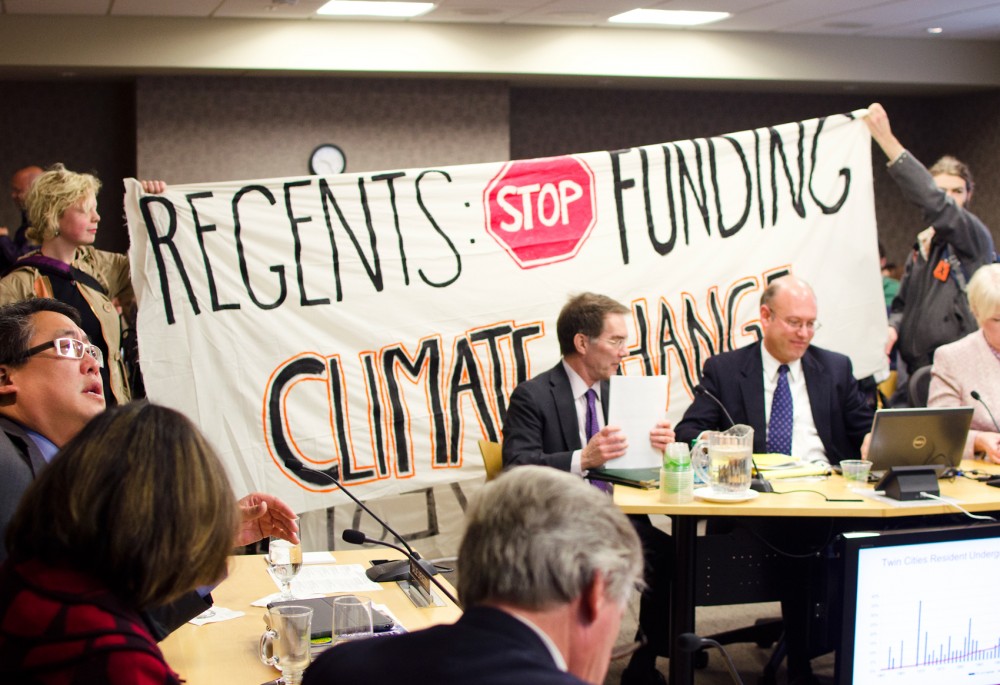Goldy Gopher wedded an oil company executive in a mock ceremony Thursday morning that kicked off a demonstration against the University of Minnesota’s fossil fuel investment.
At the conclusion of a Board of Regents committee meeting, seven students from Fossil Free Minnesota, a fossil fuel divestment group on campus, interrupted the meeting with chants urging board members to reinvest in cleaner energy.
The wedding scene symbolized the relationship the University has with the fossil fuel industry and the dependence they each have on each other, said Miranda Hanson, a senior studying environmental geography and a member of the group.
The relationship is representative of one that many large institutions have with fossil fuel companies, Hanson said.
She said the group has tried to contact the regents in the past about this issue, but they have been unresponsive.
Because of the lack of cooperation, the group decided to take a more radical approach by walking in on the board committee meeting Thursday, she said.
“We did mean to be disruptive and to irritate them because we’re frustrated, too, that they haven’t responded to this issue,” Hanson said.
But the protesters, holding up signs and chanting, entered the meeting room as the meeting ended, leading to confused regents.
“I’m not sure exactly where they’re asking us to go, but I can tell you the University is making efforts to reduce our carbon emissions,” Regent Michael Hsu said, pointing to recent investments in battery-powered buses and hybrid vehicles.
From the board’s perspective, there is an economic concern in order to keep tuition as low as possible for students.
“The less money we earn from our investments, the more we have to raise tuition on students,” Hsu said.
He said he has no problem with the students protesting if it is done peacefully.
“They’re doing something for their cause, and that’s great,” Hsu said. “That’s part of being in college and learning.”
Last year regents discussed fossil fuel investments at several meetings and decided not to divest from them, Office of Investments and Banking Associate Vice President and Chief Investment Officer Stuart Mason said.
Of the University’s total endowment of $1.3 billion, Mason said one-third, or $430 million is invested in public stocks, which include oil and coal companies.
Although they don’t track specific dollar amounts, Mason said he estimates no more than $10 million in University money is invested into fossil fuel companies.
The University hires investment managers to decide which stocks to invest in, he said, so the regents and the OIB have little control over the amount they invest.
The investment managers are instructed to use low-carbon investment strategies, which limit the amount of coal and oil companies they can invest in, Mason said.
“We’ve done the best we can to get it this low,” he said.
Mason said it would be more expensive to completely eliminate the small percentage of fossil fuel companies, which would take away potential scholarships for students.
But the money isn’t the main purpose of their cause, art sophomore Paige Carlson said.
“A lot of people get tripped up on divestment because the goal is not to weaken the fossil fuel industry by divesting this one endowment,” Carlson said.
If the University were to divest it wouldn’t make that much of a difference to the companies, she said, but it does make a powerful social and political statement.
Carlson said divestment could also have the potential to influence other institutions and cities to follow suit.
“If you look at the University of Minnesota’s mission statement, it says that they’re preparing their students for challenges that the community and the world faces in the
future,” Hanson said. “And climate change and these environmental issues are obviously a large challenge that our generation is facing.”











